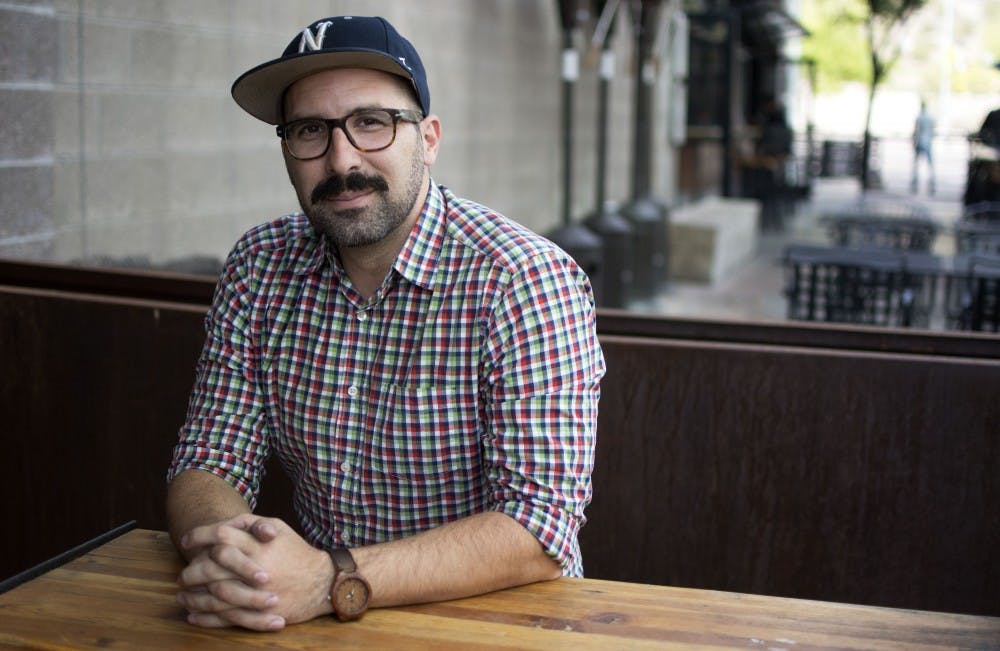Marvin Gonzalez de Leon is a graduate student, poet and playwright who talks softly but passionately about his work and the importance of writing and performing stories about diverse communities.
Even though Gonzalez hasn’t been writing for theater for very long — “I’ve only taken it seriously for four and a half years,” he said — he’s already written nine plays. He’s been selected, twice, by a national program to write a ten-minute play and have it produced in New York City.
And this week, his play “Haboob” will premier on ASU’s Mainstage.
The play tells the story of a young man seeking his fortune along the Mexico-U.S. border and his family, who follow him into a desert storm — the titular haboob.
"Haboob" is many things: comedy, dance, magical realism. Most importantly, it’s a work that incorporates Gonzalez’s own experiences and reflections on Latino identity.
Gonzalez is the son of Mexican immigrants, and he comes from a small mining town in Nevada. Now, he’s a graduate student and playwright, living and working near where his parents once crossed the border.
“Being in the part of the country, literally a couple hundred miles from where all of my family began their American story, has had a profound impact on me,” Gonzalez said. “I just needed to explore that idea and write about it.”
A Play Rooted in Identity
"Haboob" explores both Gonzalez’s own experiences and Latino identity by weaving together his own family’s stories and Latino literary traditions of magical realism.
Gonzalez’s work, he said, comes from his desire to take his audience on a journey and explore ideas in ways that aren’t possible in the real world. Through comedy and dance, his play asks the audience to suspend their disbelief and have fun.
“He brings poetic sensibilities and theatrical ones together, which would certainly be the case with 'Haboob,' a surreal journey into consciousness,” Guillermo Reyes, the head of dramatic writing at the School of Film, Dance and Theatre, wrote in an email interview.
“I don’t like writing really realistic stuff,” Gonzalez said.
Still, he said he doesn’t want his work to be escapism, it’s still going to make people think about very personal issues, like identity, culture and family.
“This piece is really unique because it blends some of Marvin’s autobiography with cultural context and magical realism,” said Xanthia Walker, an ASU doctoral student in theater for youth and the director of “Haboob."
Both Gonzalez and Walker cited the novel “Pedro Paramo,” by Mexican author Juan Rulfo, as a work that influenced “Haboob.”
In the magical realism genre, characters encounter magic or extraordinary events, but treat them as unexceptional. Reality and fantasy become blurred.
That was true of a lot of the stories that Gonzalez heard growing up, he said. But the autobiographical part mostly stops there.
“It’s not based on my life, necessarily, but there’s a lot of me in it,” Gonzalez said. “I don’t think there’s a way you can’t write something personal. Whatever feelings you’re going through at the time, they seep into whatever you’re writing.”
The Making of Haboob
When Gonzalez came to ASU, he said his decision was based on the resources at the University and a “hands-off approach” to students’ work. In particular, he cited the opportunity to collaborate with Latino artists in the Valley.
“That’s been one of the more rewarding parts of the experience here, I think,” he said.
His play was one of only a few selected by the School of Film, Dance, and Theatre to be produced through a competitive process that involves reviewing proposals from students throughout the school.
“You’re not guaranteed a spot on the MainStage,” Gonzalez said.
Gonzalez’s play, which ultimately was selected, started out with just a title and a setting. When Gonzalez encountered a haboob while driving to Tucson, he became fascinated with setting a play inside of one.
A reading of the play was held last October, but Gonzalez said that’s not the play that will be performed over the next week. When he went home for winter break, he changed the entire script.
“It wasn’t a page one rewrite," he said. "But almost.”
Walker, the director of “Haboob,” has over half a decade of experience directing new plays, and she said making changes during production is entirely normal.
Walker said directing the play was a much more flexible process than that of directing an established work.
“Things will grow and change, and that’s part of the process,” she said.
When it finally premiers this week, Gonzalez said he thinks it is going to be a lot of fun for the audience.
“Those lines [between fantasy and reality] should be blurred in magical realism,” Gonzalez said. “Why not make it weird?”
Tickets to the play, which will run on the weekends of April 14-15 and April 20-23, are $10 for general admission and $5 for students.
Reach the reporter at eaobrie2@asu.edu or follow @eobrien164on Twitter.
Like State Press on Facebook and follow @statepresss on Twitter.




